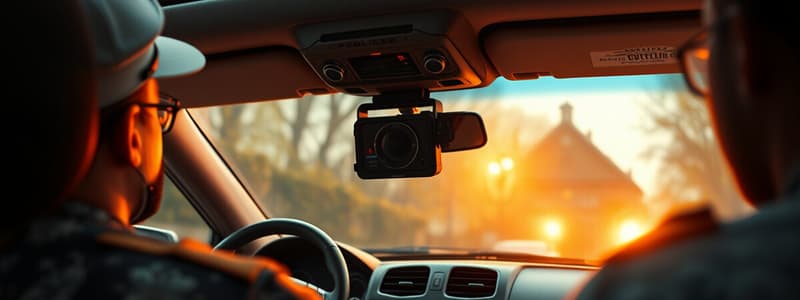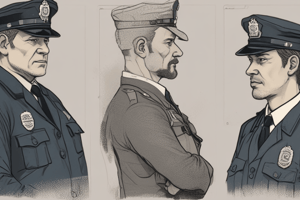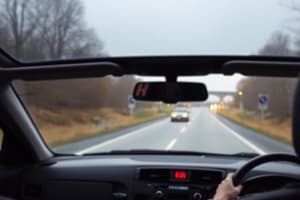Podcast
Questions and Answers
What is one of the primary purposes of the In-Car Camera System (ICCS)?
What is one of the primary purposes of the In-Car Camera System (ICCS)?
- To monitor officer behavior only during night shifts
- To improve the aesthetic of police vehicles
- To enhance public trust and police legitimacy (correct)
- To replace traditional policing methods
If an officer needs to deactivate the ICCS due to a sensitive incident, what must they do afterward?
If an officer needs to deactivate the ICCS due to a sensitive incident, what must they do afterward?
- Record an audio statement and deactivate it permanently
- Notate the reason in a memorandum book (correct)
- Inform the public about the deactivation immediately
- Submit a report to the police chief
What action is required if an ICCS malfunctions during use?
What action is required if an ICCS malfunctions during use?
- The recording should be disposed of immediately
- The malfunction doesn't need to be documented
- A Supervisory Officer must be notified (correct)
- The officer can continue without reporting it
In which situation can officers temporarily deactivate the ICCS without repercussions?
In which situation can officers temporarily deactivate the ICCS without repercussions?
What should officers do if a member of the public requests access to an ICCS recording?
What should officers do if a member of the public requests access to an ICCS recording?
Which action must a police officer NOT take when using an ICCS equipped vehicle during a pursuit?
Which action must a police officer NOT take when using an ICCS equipped vehicle during a pursuit?
What is the first step a police officer should take when starting their shift in an ICCS equipped vehicle?
What is the first step a police officer should take when starting their shift in an ICCS equipped vehicle?
When must a police officer manually enter identification information into the ICCS?
When must a police officer manually enter identification information into the ICCS?
What must a police officer do before deactivating the ICCS during an active incident?
What must a police officer do before deactivating the ICCS during an active incident?
What should a police officer do if they accidentally deactivate the ICCS?
What should a police officer do if they accidentally deactivate the ICCS?
What should members do if a Service vehicle equipped with an ICCS has been involved in a collision that caused the engine to stop?
What should members do if a Service vehicle equipped with an ICCS has been involved in a collision that caused the engine to stop?
What is the responsibility of a supervisory officer regarding the training of officers assigned to an ICCS equipped vehicle?
What is the responsibility of a supervisory officer regarding the training of officers assigned to an ICCS equipped vehicle?
What should a Case Manager do upon receiving a request for an ICCS recording from the Crown Attorney's office?
What should a Case Manager do upon receiving a request for an ICCS recording from the Crown Attorney's office?
What should be done when an ICCS malfunction occurs?
What should be done when an ICCS malfunction occurs?
How often should supervisory officers review each officer’s ICCS recordings?
How often should supervisory officers review each officer’s ICCS recordings?
What is one of the primary goals of equipping front-line officers with Body-Worn Cameras (BWCs)?
What is one of the primary goals of equipping front-line officers with Body-Worn Cameras (BWCs)?
Under what condition can recordings from BWCs be released to the public according to the procedure?
Under what condition can recordings from BWCs be released to the public according to the procedure?
What is the penalty for a police officer failing to comply with the BWC Procedure after being trained for sixty calendar days?
What is the penalty for a police officer failing to comply with the BWC Procedure after being trained for sixty calendar days?
When are officers permitted to record interactions in private spaces without obtaining consent?
When are officers permitted to record interactions in private spaces without obtaining consent?
What should officers do if they are in a private location with consent, but the owner/occupant requests not to be recorded?
What should officers do if they are in a private location with consent, but the owner/occupant requests not to be recorded?
Under what circumstances should an officer start recording their BWC at a protest?
Under what circumstances should an officer start recording their BWC at a protest?
What is the minimum retention period for BWC records before secure destruction?
What is the minimum retention period for BWC records before secure destruction?
What must happen if an officer obstructs their BWC to protect an individual's dignity?
What must happen if an officer obstructs their BWC to protect an individual's dignity?
Who is allowed to access BWC recordings under specific circumstances?
Who is allowed to access BWC recordings under specific circumstances?
What should an officer do if they suspect a breach of the BWC system?
What should an officer do if they suspect a breach of the BWC system?
How should an officer approach recording in a place of worship?
How should an officer approach recording in a place of worship?
When can an officer accessing a BWC recording be allowed to review it?
When can an officer accessing a BWC recording be allowed to review it?
What is the main purpose of BWC recordings during demonstrations?
What is the main purpose of BWC recordings during demonstrations?
What does the Information Security Policy govern regarding BWC recordings?
What does the Information Security Policy govern regarding BWC recordings?
When may consideration be given to retaining BWC recordings for training?
When may consideration be given to retaining BWC recordings for training?
Flashcards are hidden until you start studying
Study Notes
In-Car Camera System (ICCS) Rationale
- ICCS enhances public trust, police legitimacy, and officer accountability.
- Aims to improve safety for both officers and the public.
- Facilitates bias-free service delivery and early resolution of complaints.
- Provides reliable evidence for investigations and legal processes.
- Offers insights into the effectiveness of police procedures and training.
Supervisory Officer Responsibilities
- Immediate notification is required for ICCS malfunctions, damage, or theft.
Officer Protocol for ICCS
- Officers must continue recording if objections to recording are raised in public spaces.
- For sensitive incidents, officers may deactivate the ICCS temporarily to protect privacy.
- Documentation of any deactivation must be recorded in a memorandum book.
Recording Procedures
- Officers must complete prescribed training before operating ICCS.
- Check ICCS functionality at the start of each shift:
- Ensure cameras and microphones are operational.
- Confirm cameras are unobstructed and properly positioned.
- Record all public interactions related to police investigations using ICCS, including emergencies and vehicle pursuits.
- Wireless microphones must be worn at all times when the ICCS is active.
Classifications and Notifications
- Upon ICCS activation, notify individuals that recording is taking place.
- Recordings must be classified for retention immediately after incidents, including details of any accidental deactivation.
Handling Sensitive Information
- Notify the Controller immediately if privileged information is accidently recorded.
- ICCS recordings under the Special Investigations Unit (SIU) mandate must be protected and cannot be deactivated without authorization.
Case Manager Role
- Ensure accurate inventory and classification of ICCS recordings.
- Comply with requests for ICCS recordings from legal representatives.
Body-Worn Cameras (BWC) Overview
- BWCs capture interactions with the public during duty to enhance transparency and accountability.
- Recordings are supplementary to written documentation (e.g., memorandum notes).
- Covert recordings by uniformed officers are prohibited.
Recording Contexts
- Private Space: Recording allowed with consent, warrants, or exigent circumstances; officers must respect consent.
- Public Space: Recordings continue despite objections, maintaining a lawful presence.
- Special circumstances at demonstrations or protests may complicate recording compliance.
Discipline and Compliance
- Non-compliance with BWC procedure results in mandatory penalties, escalating for supervisors.
- Progressive discipline applies for repeated violations, emphasizing continuous adherence to standards.
Summary of Compliance Functions
- Supervisory officers must assure all assigned personnel have appropriate training and regularly review recordings.
- Officers must not restart vehicles after collisions to access ICCS recordings; recordings are only accessed if the vehicle remains functional.### Body-Worn Cameras (BWC) Usage Guidelines
- BWCs are not intended for general surveillance or discouraging lawful public assembly, demonstration, or protest.
- Officers must activate BWCs when engaging with the public for law enforcement purposes, particularly if a violation of the law is suspected.
- Officers observing peaceful events without engagement should not record unless a potential infraction arises.
Sensitive Incidents and Privacy Considerations
- Recording sensitivity on videos involving victims, witnesses, or suspects should be prioritized.
- Officers may temporarily obstruct the camera to protect a person's dignity during sensitive situations, documenting the action in their memo book.
- When in places of worship, officers must respect the privacy of individuals engaged in religious activities and communicate the reasons for recording.
BWC Management and Retention Policies
- BWCs and related recordings are considered Information Technology Assets governed by security policies to ensure secure storage, transfer, and destruction.
- Recordings are retained for a minimum of two years plus one day, complying with the Limitations Act, followed by secure destruction unless specified otherwise.
- All actions with BWC recordings are logged and auditable, ensuring accountability and security.
Access and Disclosure of BWC Recordings (Internal)
- Access to recordings is strictly limited to authorized service members for specific roles, including supervisors, investigators, and legal counsel.
- Recordings may be used for internal audits, training material (with anonymization), and investigations of reported incidents or complaints.
Access and Disclosure of BWC Recordings (External)
- External access is permitted according to legal stipulations, including independent oversight bodies and various legal authorities.
- Requests from the public to view or obtain recordings are processed by the Access and Privacy Section.
Officer Protocol for BWC Usage
- Completion of BWC training is mandatory before use.
- BWCs must not replace standard reporting methods and should be used strictly according to established guidelines.
- Officers are required to maintain BWC functionality, ensure proper mounting, and start recordings at appropriate times during investigative or enforcement interactions.
Prohibited Recording Situations
- Officers cannot record non-investigative activities, strip searches, administrative talks, or in sensitive environments like healthcare facilities unless specific conditions apply.
- Recording during confidential interactions or in Indigenous ceremonies requires explicit consent from relevant parties.
Session Management and Documentation
- When recording, officers must inform the public about the recording.
- Recorded sessions should not be stopped or muted until the event concludes unless specific circumstances arise that require it.
- Any accidental stoppages in recording must be immediately rectified while documenting the reason.
Accountability and Reporting
- Officers must notify supervisors of any malfunction, loss, or theft of BWCs and document breaches or unauthorized access to recordings.
- Supervisors are responsible for ensuring compliance with BWC guidelines and conducting monthly reviews of officers' recordings to facilitate training and identify issues.
Conclusion and Compliance
- Knowledge of BWC policies ensures officers conduct themselves professionally while prioritizing the dignity and privacy of individuals.
- Proper documentation and adherence to guidelines not only enhance accountability but also protect the integrity of law enforcement processes.### Body-Worn Camera (BWC) Policies
- SIU incidents require compliance with directives from the Chief’s SIU On-Call Designated Authority and uploading BWC footage to the cloud.
- Upon realizing a BWC malfunction, officers must immediately inform the HELP desk and ensure the faulty camera is returned for replacement.
- Loss, damage, theft, or unauthorized access to a BWC necessitates immediate notification to the Officer in Charge (OIC) via internal memorandum (TPS649).
Case Manager Responsibilities
- Case Managers must select “Body-Worn Camera” in eReports when charges involve recorded incidents for retrieval of relevant recordings.
- Essential eReport information includes the recording officer's badge number, surname, and the recording start date and time.
- A synopsis of recorded incidents should be added in the eReport for contextual clarity.
Recording Multiple BWCs
- When incidents involve multiple BWCs, ensure separate eReport entries for each device used.
Disclosure of BWC Recordings
- Adhere to Procedure 12-08 when disclosing BWC recordings.
Officer in Charge (OIC) Duties
- OICs must ensure all BWC-equipped officers have received appropriate training and adhere to operational directives.
- Supervisors are required to review each BWC officer's recordings at least once a month to evaluate performance and training needs.
Definitions of Terms
- "Call for Service" includes police response to public assistance requests for various incidents, including detentions and public disorder.
- "Mute" indicates video recording without audio; "Off" means the BWC is powered down, and "On" indicates it is operational with a 30-second pre-event recording.
- "Private Place" refers to areas where privacy from surveillance is expected, while "Public Place" denotes areas accessible to the public.
Search Levels
- Protective Search (formerly Level 1) allows for limited exterior searching of a detained person posing safety risks.
- Strip Search (formerly Level 3) requires higher justification due to invasions of personal privacy and must be substantiated by reasonable grounds linked to the arrest.
- Strip searches involve thorough clothing inspection and body area visual checks, excluding mouth inspections.
Special BWC Modes
- Stealth Mode allows BWC to record while suppressing lights and sounds for officer safety during sensitive operations.
- Stop Recording refers to processes halting BWC audio and video data capture.
Studying That Suits You
Use AI to generate personalized quizzes and flashcards to suit your learning preferences.





